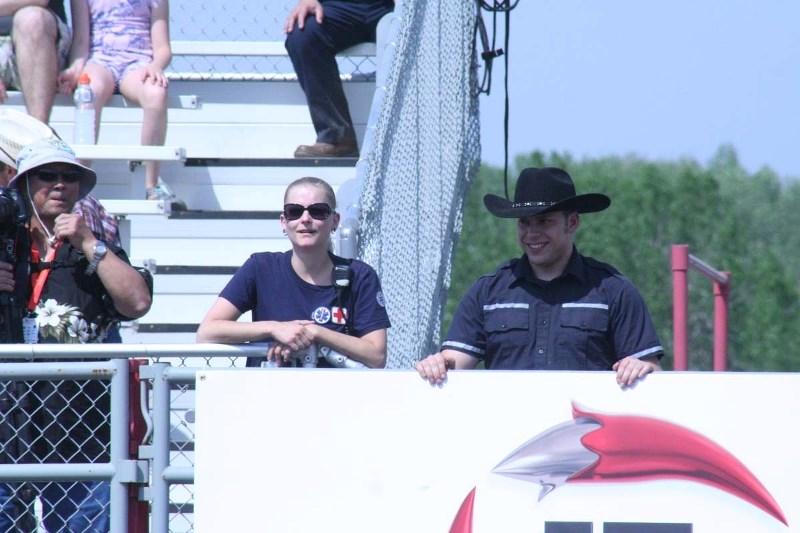There’s no doubt that as far sports go, rodeo ranks as one of the most physically demanding – and dangerous.
This is plain to see for anyone in the crowd watching the cowboys hop on to an angry bull and hold on for dear life, or throw themselves off their horses at a cow doing its best to get away.
But at last weekend’s Rainmaker Rodeo in St. Albert, there were two people who saw up close and personal just what kind of risks these cowboys are taking.
Zak Souter-Lucas and Jessica Maisonneuve spent the weekend working the rodeo as medics, patching up cuts and splinting the occasional broken bone, and know first-hand that these athletes are as tough as nails.
“The reality is these guys know what they’re doing, and cowboys are really tough guys,” Souter-Lucas said. “When they go down and don’t get back up, that means it’s major.”
And it’s not exactly a day in the park for these two, just sitting around waiting for something to happen. Maisonneuve estimated there are about three different incidents every hour, enough to keep them busy even though the vast majority are minor bumps and bruises.
There are sometimes major head traumas or other serious concerns, but they’re relatively rare.
“They’re pretty safe out here,” she said. “We haven’t had many serious incidents.”
Souter-Lucas said while he’s never happy to see people sustain injuries, rodeo-related injuries tend to be among the more interesting injuries medics might have to deal with and the people who sustain them are always still passionate about what they do.
“We never want to see someone get hurt, but the reality is if they’re going to get hurt we want it to be doing something that they love,” he said.
They’re medics not just for the rodeo events, but for the entire event as well, which means they switch gears several times throughout the day for different events.
The way to approach emergency medical care at rodeo is quite different from the approach at the concerts in the evening.
“It’s the same folk,” Souter-Lucas said. “It’s really just switching what we do with the gear.”
For example, the spine board is easily accessible during rodeo events because head, neck and spine injuries are a more significant risk for the rodeo cowboys than for concertgoers.
At night, the spine board gets left in the truck, and the two medics stock up on small bandages, alcohol swabs and, not surprising considering the late-night party crowd, vomit bags.
But for all the less-pleasant aspects of the job, there’s much more to be happy about when working in a crowd that has such a festive mood.
“I love watching the kids try to catch the ponies, and seeing all the happy cowboys,” Maisonneuve said.




